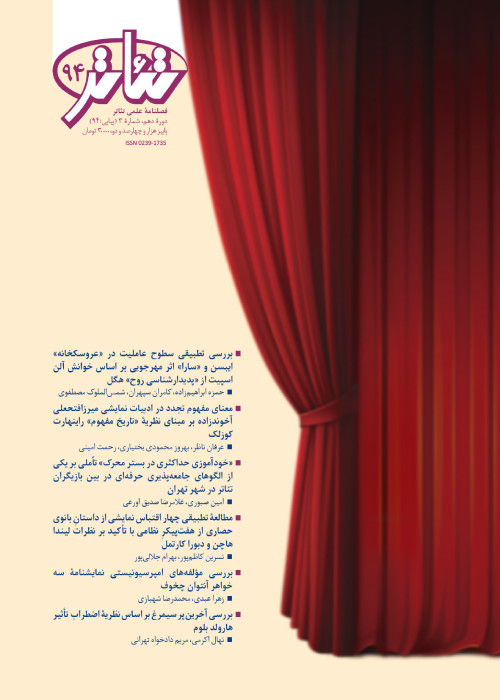Studying the Image of Iranian Woman in Khanoumche va Mahtabi Written by Akbar Radi, with Simone de Beauvoir’s Feminist Existentialism Approach in The Second Sex
Author(s):
Abstract:
In her book The Second Sex, Simone De Beauvoir, the feminist existentialism theorist, states that woman is not born a woman, rather becomes a woman. With this approach, she considers “becoming a woman” something dependent on an element called “situation” which is the civilization and the historical, cultural, and political context of the society, which moves towards masculism and is the primary cause of women’s inferiority.Simone De Beauvoir believes that in a “maledominated” system, women are oppressed because they are another “man” in comparison with their own “self”. Therefore, a man is the “self” and free and is a determinative existent which defines the meaning of his own existence. While, a woman is “the Other” that is, the object of identification whose meaning is determined by what she is not ... Simone De Beauvoir adopted the feminist theory – existentialist or the object of being “the Other” from Sarter’s idea about the conflictual nature of human relationships. In her view, to be in the “Other” category for women is a fundamental concept in human thinking which is ingrained in the minds throughout history. “Male-dominated” system has not historically had a sectional domain and been limited to a border but had a universal scope which has been regarded as a “position” for the considered societies. With this approach, the “female character” in Iran has always been a reflection of the cultural, social, economic, and political “position” of the era of its own. This “character” on “position” is reflected in the best way possible in the works of the writers who have depicted their own society in a more pragmatic approach. Akbar Radi is a playwright who elicits his characters from the heart of the society through an objective, critical, and analytical attitude towards social phenomena. Among her works, the “Little Miss and moonlit” (Khanomche and Mahtabi) play from the perspective of addressing “female character” in Iran has been unique and had a special place throughout history. “Little Miss and Moonlight” is a non-linear narrative with seven episodes in which Akbar Radi has dealt with the lives of four Iranian women named Khanjvn, Leila, Gelin, and Mahroo from four different historical periods in iran but with common concerns and traumas.In this research, the author has started her investigation having this viewpoint that de Beauvoir’s thoughts are applied in female characters of Akbar Radi’s play Khanoumche va Mahtabi. Features that Simone de Beauvoir assigns to women include submission, objectification, narcissism, and belief in superstitions and witchery, which can be observed in these four characters (Khanjoun, Leila, Galin, and Mahrou). These four women are categorized as “married women” by de Beauvoir, which implies marriage, social life, and motherhood. The author believes that the connection of these four women and several different historical periods through Khanjoun’s dreams with similar elements such as “snake” is a reflection of their “collective unconscious”.. Moreover, the similarity between Simone de Beauvoir and Akbar Radi’s viewpoints, which have considered woman with a critical outlook and common elements, is of this category.
Language:
Persian
Published:
Theater, Volume:5 Issue: 72, 2019
Pages:
13 to 31
magiran.com/p1977063
دانلود و مطالعه متن این مقاله با یکی از روشهای زیر امکان پذیر است:
اشتراک شخصی
با عضویت و پرداخت آنلاین حق اشتراک یکساله به مبلغ 1,390,000ريال میتوانید 70 عنوان مطلب دانلود کنید!
اشتراک سازمانی
به کتابخانه دانشگاه یا محل کار خود پیشنهاد کنید تا اشتراک سازمانی این پایگاه را برای دسترسی نامحدود همه کاربران به متن مطالب تهیه نمایند!
توجه!
- حق عضویت دریافتی صرف حمایت از نشریات عضو و نگهداری، تکمیل و توسعه مگیران میشود.
- پرداخت حق اشتراک و دانلود مقالات اجازه بازنشر آن در سایر رسانههای چاپی و دیجیتال را به کاربر نمیدهد.
In order to view content subscription is required
Personal subscription
Subscribe magiran.com for 70 € euros via PayPal and download 70 articles during a year.
Organization subscription
Please contact us to subscribe your university or library for unlimited access!


